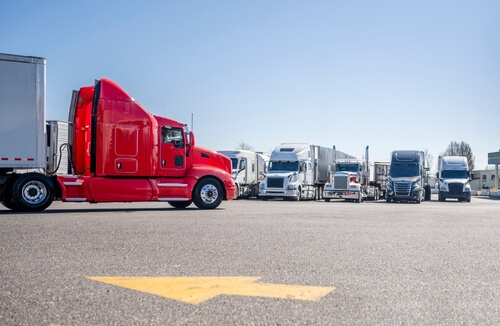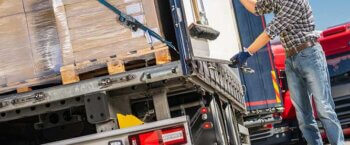Interstate vs. Intrastate Trucking: Everything You Need to Know

What are you waiting for?
Make more money starting now.
TL;DR
Intrastate truckers typically stay close to home, working within the same state where they live. Interstate truckers, however, have the freedom to cross state lines.
On this page
- The nuances of interstate and intrastate trucking
- Interstate vs. intrastate trucking: what are the differences?
- Types of trucks used for interstate and intrastate trucking
- Insurance requirements
- Operating authority
- Unified Carrier Registration
- IFTA compliance
- Similarities between interstate and intrastate commerce
- Find and book high-paying intrastate and interstate loads
When you’re first starting out as a truck driver, there are several questions to consider, and one of the most important ones is: What’s the difference between intrastate and interstate trucking?
Keep reading to learn more about the differences between driving within your home state and crossing state lines and requirements for each.
The nuances of interstate and intrastate trucking
While the main difference between interstate and intrastate trucking is whether you cross state lines or national borders, there are details that many carriers don’t always know.
Freight that travels through multiple states falls under interstate commerce rules even if you only handled a part of its journey and never left your home state. Also, sometimes the best route from one point to another might necessitate crossing state lines. For example, if you’re transporting cargo from Baton Rouge, LA., to Monroe, LA., it might be most efficient to take Highway 61 through Mississippi. This would be considered interstate trucking, even though pickup and delivery is within a single state.
Interstate vs. intrastate trucking: what are the differences?
What’s the difference between interstate and intrastate trucking? First, let’s look at the actual definitions of interstate vs. intrastate trucking.
Interstate trucking
Interstate trucking carriers can haul freight that crosses state or national borders, including anywhere in the U.S., Canada, or Mexico.
For federal purposes, this can also include freight picked up and transported in the state if you have to cross state lines to complete the delivery. Another overlooked situation is when freight crosses state lines, but your involvement is picking up and delivering to warehouses within the state. For example, a shipment from Chicago to Nashville might cross Illinois, Indiana, Kentucky, and Tennessee. Even if you only handle the Indiana portion of the trip, you are still participating in interstate trucking.
Intrastate trucking
Intrastate trucking companies haul freight within state boundaries and do not cross state or national borders.
Types of trucks used for interstate and intrastate trucking
Although any truck with proper licensing can do both intrastate and interstate trucking, these are the most common types of trucks intrastate carriers use:
- Box trucks
- Garbage trucks
- Dump trucks
- Concrete mixing trucks
- Bucket trucks
- Tow trucks or wreckers
Intrerstate trucks are:
- Reefer trucks
- Tanker trucks
- Flatbed trucks
- Semi-trucks, tractor-trailers, and 18 wheelers
Insurance requirements
There are also different insurance requirements for interstate trucking vs. intrastate trucking.
Interstate trucking
The Federal Motor Carrier Safety Administration (FMCSA) requires carriers hauling freight across state lines to meet minimum coverage limits for public liability insurance. Coverage minimums will vary depending on the type of freight you move and the vehicle weight.
- Non-hazardous transported in a vehicle weighing less than 10,001 pounds: $300,000
- Non-hazardous transported in a vehicle weighing more than 10,001 pounds: $750,000
- Hazardous material moved by private carriers and for-hire: $5 million
- Oil carried by private carrier and for-hire: $1 million
These are minimums. Many shippers and brokers will require you to have at least $1 million worth of coverage, even for non-hazardous freight.
Intrastate trucking
Insurance requirements for intrastate hauling vary by state. Some states, such as California and Colorado, mirror the FMCSA guidelines, while others have different minimums. For example, Florida requires minimum coverage ranging from $50,000 to $300,000 depending on weight for non-hazardous cargo.
Operating authority
An operating authority functions similarly to a business license, and there are differences between intrastate vs. interstate trucking.
Interstate trucking
Before you can get an operating authority to operate across state lines, you’ll need a USDOT number from the Department of Transportation. Anyone hauling freight across state lines needs an interstate operating authority except those working within a federally designated commercial zone. Commercial zones are often near major metro cities that cross states, such as Washington D.C., extending into Virginia and Maryland.
Intrastate trucking
Generally, carriers do not need a federal operating authority for intrastate commerce. About half the states in the country do require state authority for operation. However, each state has different rules and regulations governing operating authority for intrastate transportation, so carriers should check with the appropriate state agency.
Unified Carrier Registration
Carriers operating interstate are also required to register as part of the Unified Carrier Registration (UCR) Act.
It can be somewhat confusing because not every state participates in UCR registration. Currently, 41 states participate in the UCR program. But even if your state doesn’t participate, you still have to register if you’re an interstate carrier.
IFTA compliance
The International Fuel Tax Agreement (IFTA) and International Registration Plan (IRP) give states the authority to collect fuel taxes under a carrier’s license without requiring motor carriers to get a fuel permit for each state. In other words, you only have to file and pay taxes in the same state where you live.
Several states, however, do require separate intrastate fuel permits, including:
- Connecticut
- Indiana
- Kentucky
- Maine
- North Carolina
- Pennsylvania
- Utah
- West Virginia
Carriers that generally operate within state borders can get temporary fuel and trip permits for interstate commerce instead of registering for IFTA and IRP.
Similarities between interstate and intrastate commerce
There are also similarities in interstate vs. intrastate trucking that apply to every freight carrier. Regardless of state rules, every carrier must comply with:
- Commercial driver’s license (CDL) requirements
- Drug and alcohol testing
- Commercial trucker insurance
- Hazardous materials certification (if transporting hazardous materials)
Carriers must also ensure drivers are qualified to drive commercial motor vehicles, maintain the proper insurance requirements, and follow all state, interstate, and federal trucking regulations.
Frequently asked questions (FAQs)
Find and book high-paying intrastate and interstate loads.
Truckstop has years of experience helping carriers navigate the complexities of both interstate and intrastate regulations. We provide the tools and resources you need to stay compliant and keep your business running smoothly.
With the Truckstop Load Board for Carriers, you can quickly find and book high-paying loads. Whether you’re hauling freight interstate or intrastate, you can search by equipment type, load density, lanes, and more, to find the loads that work for you and your business.
With tens of thousands of legitimate loads posted by vetted brokers, you can find and book loads in just a few clicks and get a rate confirmation in seconds, with features like Book It Now.
Sign up for the Truckstop Load Board today to get started.
Get helpful content delivered to your inbox.
Sign up today.
Find high-quality loads fast, get higher rates on every haul, and access tools that make your job easier at every turn.







